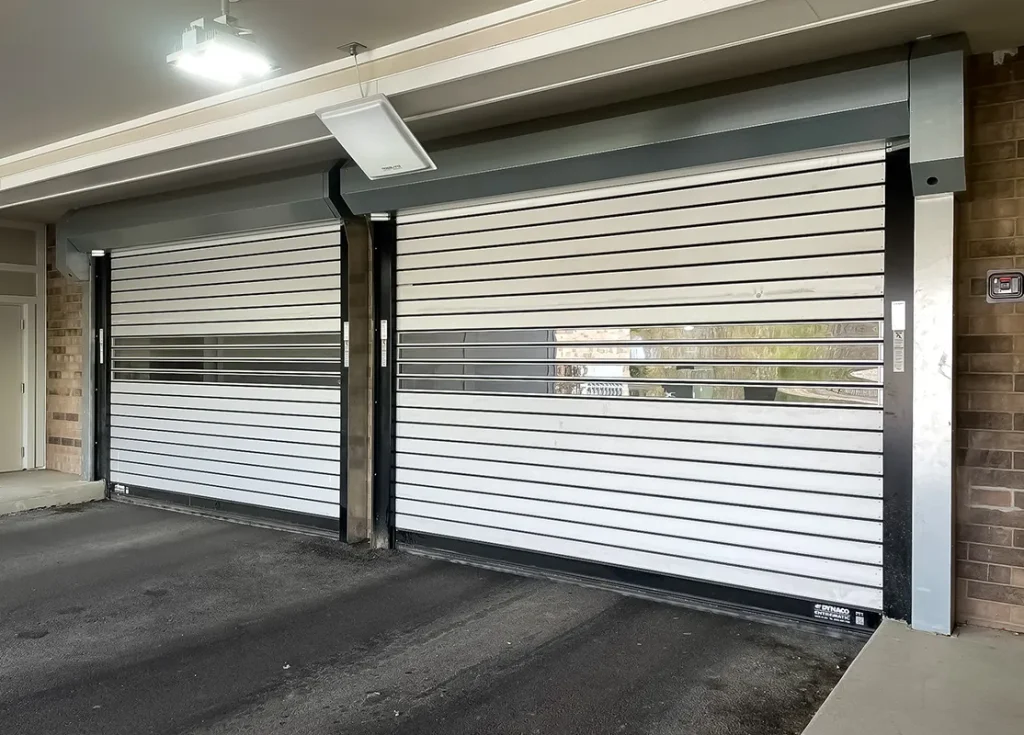
Roller door is a type of doors and windows with a long history, commonly found in traditional buildings and houses. Mainly include wooden roll up doors, iron roll up doors, aluminum roll up doors, PVC roll up doors, etc. This article will focus on introducing you to the reasons why aluminum roll up doors are far ahead of ordinary metal roller doors.
It not only integrates the advantages of traditional roller doors, but also abandons the shortcomings of ordinary metal roller doors, creating a perfect body with low noise, no rust, beautiful and high-end features. It includes a double-layer door curtain structure, and can choose ordinary hollow or thermal insulation polyurethane. There are two forms of foam filling, wind resistance and noise reduction. Next, let’s analyze why it has many advantages.
Roller Door Classification:
Classified by door curtain material:
1. Fully transparent fast roller door
Made of high-density polyvinyl chloride coated hot-melt fabric, material thickness 1.0mm-1.2mm (multiple colors available), with transparent window – PVC transparent soft board, material thickness 1.50mm, increased safety and management convenience, with integral Horizontal transparent window, composed of door curtain material.
2. Aluminum alloy/stainless steel/color plate steel roll up door
This type is relatively common and is also called fast rolling shutter. The door curtain is made of hard metal such as aluminum alloy/stainless steel/color plate steel.
3. PVC rolling shutter door
PVC canvas door curtains are generally made of PVC or PVDF membrane materials. In particular, PVDF membrane materials have better anti-aging properties, are not easy to fade, and have self-cleaning functions. They are very suitable for fast rolling doors.
4. Wood grain hard fast roller door
The curtain material of the wood grain hard fast rolling door is not wood, but Aluminiumstreifen. The surface is anodized and organically colored to form a wood grain texture (color: aluminum alloy original color, Chinese red).
What Is The Best Material For Roller Doors?
The materials of roll up aluminum door include aluminum alloy, stainless steel, PVC, fiber materials, etc. Aluminum alloy roll up doors are the most common and durable choice, with the advantages of being lightweight and easy to operate; stainless steel is suitable for places where safety and anti-theft are important; PVC rolling shutter doors are low-cost and durable; polyester fiber rolling shutter doors are suitable for places that require frequent Turns on and off to save energy.
Strength and Durability: Aluminum alloys excel in strength and durability. It has high strength and can withstand external impact and pressure, ensuring the structural stability of the roller door. In comparison, stainless steel is relatively heavy, and the commonly used 304 stainless steel is prone to scratches, reducing its overall durability. PVC and polyester fibers are lower in strength and do not offer the same impact and pressure resistance as aluminum alloys.
Lightweight: Aluminum alloy is a lightweight material, which is lighter than stainless steel. This makes it easier to install and operate the rolling shutter door. At the same time, the lightweight properties of aluminum alloy can reduce the load of rolling shutter doors on the load-bearing structure, reducing the load pressure of the overall building. PVC and polyester fibers are relatively light, but their strength and durability are poor, and they are easily affected by environmental factors, resulting in a shorter service life.
Corrosion Resistance: Aluminum alloys have good corrosion resistance, making them resistant to common oxidation and corrosion problems. In contrast, stainless steel can suffer from electrolytic corrosion due to contact with other metals and requires regular maintenance and cleaning. PVC and polyester are relatively resistant to corrosion, but they may discolor, fade, or become brittle with long-term exposure to sunlight and climate change.
Therefore, aluminum roll-up doors are currently the best roller door materials.
Detailed Description Of Aluminum Roll Up Door:
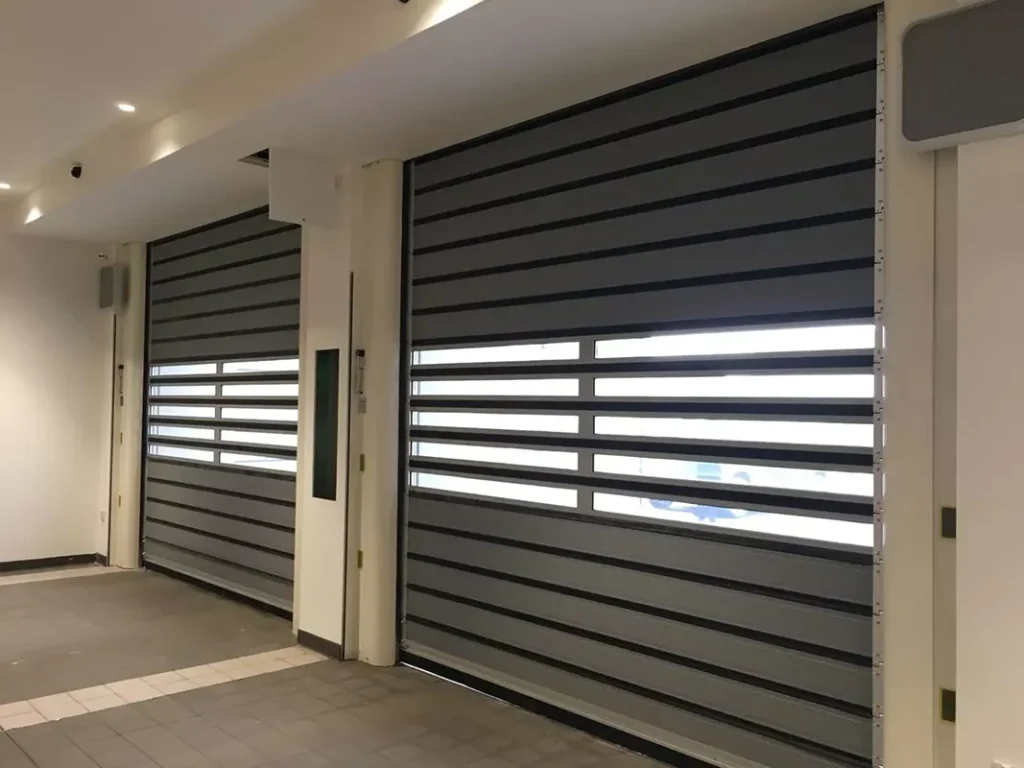
The main material of aluminum roll-up doors are aluminum alloy. Through alloying, the strength, hardness, corrosion resistance, etc. of aluminum can be significantly improved, making it more suitable for the “anti-hit” requirements of rolling shutter doors. Therefore, 6063 T5 aluminum alloy is generally used for safety protection. The specific aluminum alloy material selection still depends on the application scenarios and requirements of rolling shutter doors. For example, universal aluminum 6061 has high strength and processability, and it is also suitable for the production of rolling shutter doors; 5052 aluminum has high strength, high corrosion resistance, and high Tensile strength alloys are more suitable for high strength and durability environments. For rolling shutter doors for general domestic and commercial use, Yongsheng recommends that you use 3003 aluminum.
The main aluminum alloys commonly used for aluminum roll up garage doors are 3003, 6061 and 5052. 3003 Aluminiumlegierung has good corrosion resistance and plasticity, and is suitable for various parts of garage rolling shutter doors. 6061 Aluminium is widely used in the manufacture of various vehicle doors, including garage roll-up doors. This alloy is able to withstand different forms of stress and loading while possessing moderate hardness and durability. For garage roll-up doors that require greater strength and durability, 5052 aluminum alloy is an ideal choice. This alloy adapts to a variety of environmental conditions, including outdoor environments and humid environments, and is therefore widely used in the manufacture of garage doors.
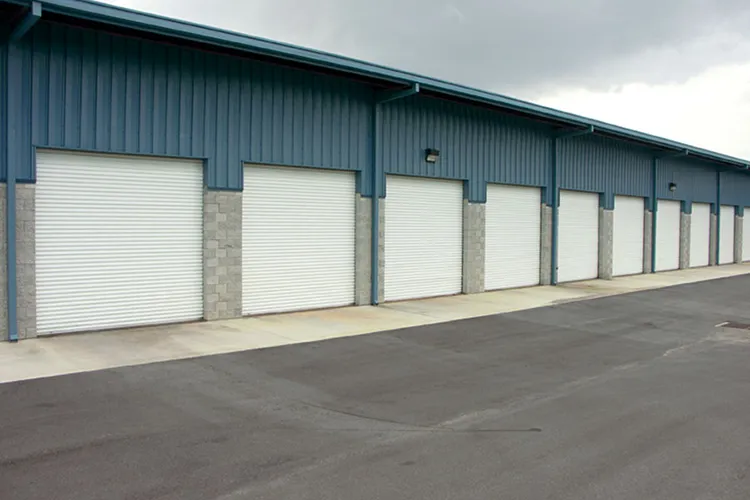
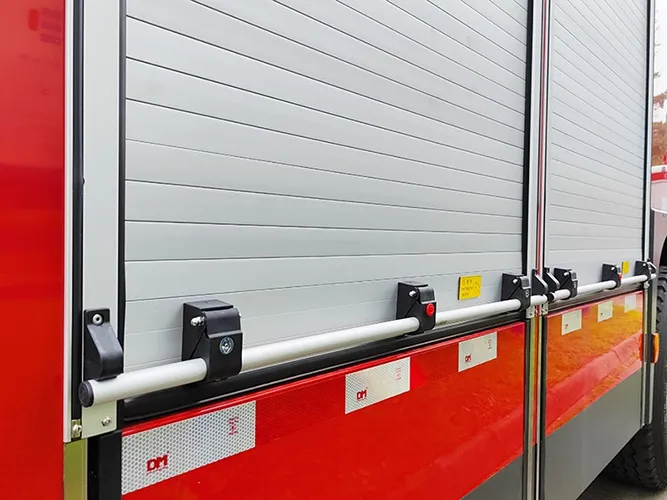
As for aluminum roll up doors for trucks, the commonly used aluminum alloys are 5052, 6061 and 6082. Aluminum 5052 and 6061 aluminum alloys have been mentioned before. 6082 aluminum alloy is also a high-strength aluminum alloy with excellent mechanical properties and corrosion resistance, and performs well in the manufacturing of aluminum roll up doors for trucks.
Advantages of Aluminum Roll Up Doors:
- Strong and sturdy
- Lightweight and convenient
- Nice appearance
- Hohe Festigkeit
- High toughness
- Konservierungsmittel
- Resist beating
- Anti-scratch
- Block malicious intrusions
- Security
- Strong weather resistance
- Anti-aging
- Resistant to rain
- Service life is more than 20 years
How Does The Aluminum Roll Up Door Work?
The traditional aluminum roll up door is a manual operating system. By manually pushing and pulling the curtain, a spring-loaded roller allows the curtain to be rolled up and unfolded. The scroll is usually located at the top of the door frame, with the door curtain attached to it. The door curtain slides open and close via a guide rail system. Guide rails are usually fixed on both sides of the door frame to keep the door curtain balanced and stable during the opening and closing process. The current rolling shutter door has been updated to a lifting system, which uses a motor and a remote control to control the operation of the motor to raise and lower the rolling shutter.
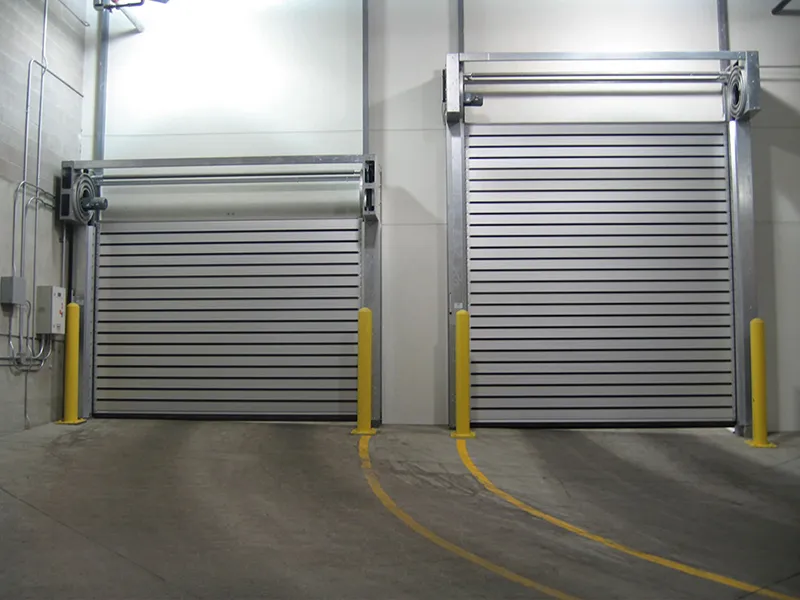
Install Aluminum Roll-Up Door:
- Preparation: Confirm door size, location and installation method. Clean the installation location to ensure it is flat and free of obstacles.
- Install door rails: Install door rails according to the size and design requirements of the door. Door rails usually consist of upper rails and lower rails, which are fixed to the wall or ground with screws or expansion bolts.
- Install the door curtain panel: Install the curtain panel of the aluminum alloy rolling shutter door to the door track. Make sure the curtain panel is aligned with the door rails and clamped with screws or clamps.
- Install the guide rail: Install the guide rail on the door body to guide the door up and down. The rails are usually fixed to the curtain panel, making sure they are parallel to the door rails.
- Install transmission: Depending on the type of door, install an appropriate transmission, such as a manual winch or an electric drive. Make sure that the transmission is securely fixed and adapted to the door curtain and guide rails.
- Install the door leaf: Insert the door leaf between the guide rail and the curtain panel, and ensure that the connection between the leaf, the guide rail and the curtain panel is tight.
- Debugging and testing: After installation is completed, debug and test the door. Ensure that the door’s rising and falling functions are normal and that the transmission device is working properly. Also test the door’s safety performance, such as sensors, remote controls, etc.
- Complete installation: After installation is complete, check that all parts of the door are secure and free of looseness or safety hazards. Clean the installation site and accept the installation results.
